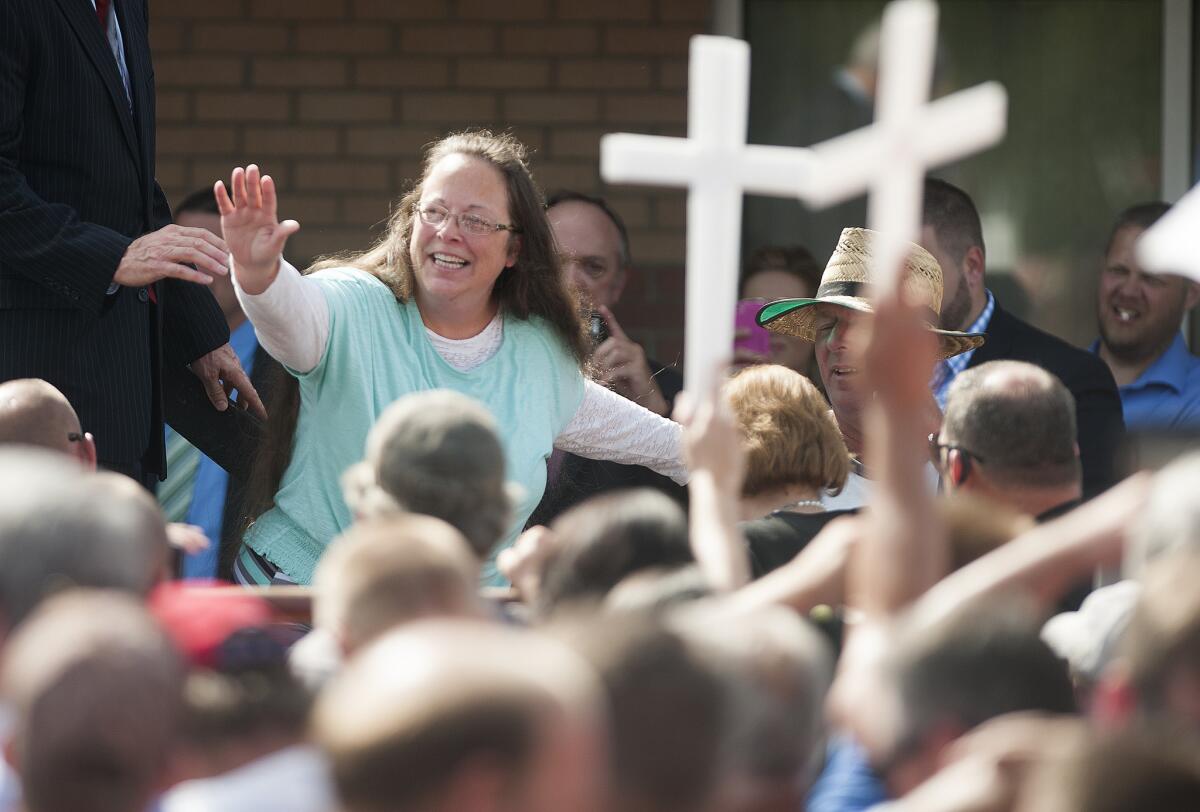Readers React: Why Kim Davis is no conscientious objector

Rowan County Clerk Kim Davis waves to supporters in front of the Carter County Detention Center on in Grayson, Kentucky, on Sept. 8.
- Share via
Kim Davis has touched a nerve with conservative Christians. Republican presidential candidates Mike Huckabee and Ted Cruz have rushed to stand alongside her. And Times readers are having none of it.
When it comes to public figures in the news, the Rowan County, Ky., clerk comes in a close second to Donald Trump for drawing the least support from our letter writers. In
fact, when one reader took to our pages this week to defend Davis, writing that her refusal to act against her religious beliefs makes her a kind of conscientious objector, nearly a dozen letters with objections to that comparison were sent to us in response.
Here are some of those letters.
Hollywood resident Preston Neal Jones mentions his experience as a Vietnam War-era conscientious objector:
Reader Gene Leo disputes The Times’ position that Kim Davis should “give up her office.” To bolster his claim that “one can exercise 1st Amendment rights and follow the moral authority of one’s religion,” he asks: “Maybe you have heard of ‘conscientious objections’ to serving in the military? Same thing.”
I have heard of conscientious objectors: I was one. In lieu of being in the military, for two years I performed what the draft law termed “alternative civilian service” (in a state school for the developmentally disabled).
If Davis wants to abide by the principle of conscientious objection, then The Times is right: She should give up her office and work for the state in another job to which she has no objections.
Sanford D. Cook, a San Luis Obispo resident and retired Army lieutenant colonel, says Davis does not deserve the protection of a conscientious objector:
Equating Davis’ refusal to issue marriage licenses to conscientious objection to military service is a phony equivalency.
Conscientious objection is declared before taking a soldier’s oath of office; a post-oath declaration is almost never recognized. Davis’ declaration and refusal of her lawful duty, made after taking her oath of office, is dereliction of duty and contemptuous, not just of the court but of her fellow Kentuckians.
We should not have to wend our way between constitutional law and religious law at the whim of public servants. This isn’t the caliphate, is it?
Mark Parrott of LosAngeles points out a key difference between Davis and a conscientious objector:
A more apt military analogy than conscientious objection would be the head of a recruitment station who objects to killing. He not only refuses to allow legally qualified applicants to enlist but forbids his subordinates from processing enlistees as well.
Davis has chosen to adhere to her religious convictions rather than perform the legal requirements of her position. She is free to do so, and has demonstrated her willingness to accept the consequences of her actions. However, her freedom to be a conscientious objector does not extend to imposing her beliefs on others.
Follow the Opinion section on Twitter @latimesopinion and Facebook
More to Read
A cure for the common opinion
Get thought-provoking perspectives with our weekly newsletter.
You may occasionally receive promotional content from the Los Angeles Times.










